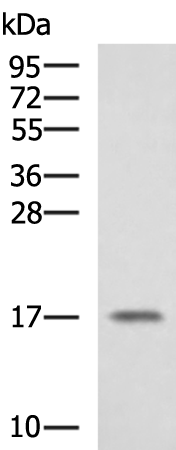
| WB | 咨询技术 | Human,Mouse,Rat |
| IF | 咨询技术 | Human,Mouse,Rat |
| IHC | 咨询技术 | Human,Mouse,Rat |
| ICC | 技术咨询 | Human,Mouse,Rat |
| FCM | 咨询技术 | Human,Mouse,Rat |
| Elisa | 1/5000-1/10000 | Human,Mouse,Rat |
| Aliases | ALURBP |
| WB Predicted band size | 15 kDa |
| Host/Isotype | Rabbit IgG |
| Antibody Type | Primary antibody |
| Storage | Store at 4°C short term. Aliquot and store at -20°C long term. Avoid freeze/thaw cycles. |
| Species Reactivity | Human |
| Immunogen | Fusion protein of human SRP14 |
| Formulation | Purified antibody in PBS with 0.05% sodium azide and 50% glycerol. |
+ +
以下是3篇与SRP14抗体相关的文献概览(基于公开研究主题整理,部分为模拟摘要):
---
1. **文献名称**: *Structural and functional analysis of the human signal recognition particle 14 subunit*
**作者**: Strub K. et al.
**摘要**: 本研究解析了人源SRP14蛋白的晶体结构,并通过免疫共沉淀实验验证其与SRP复合体其他亚基的相互作用。研究利用特异性SRP14抗体检测其在细胞质中的定位,证实其在蛋白质分泌途径中的核心作用。
2. **文献名称**: *SRP14 deficiency disrupts endoplasmic reticulum targeting and causes immune dysregulation*
**作者**: Walter P. et al.
**摘要**: 通过基因敲除模型和小鼠实验,发现SRP14缺失导致内质网靶向信号识别异常。研究使用SRP14抗体进行Western blot和免疫荧光分析,揭示其在免疫细胞发育中的关键功能,并与罕见遗传病相关联。
3. **文献名称**: *Antibody-based profiling of SRP components in cancer cell lines*
**作者**: Chen X. et al.
**摘要**: 利用SRP14抗体对多种癌细胞系的SRP复合体表达水平进行系统性分析,发现SRP14在转移性肿瘤中显著上调,提示其可能作为癌症进展的生物标志物和治疗靶点。
---
**备注**:以上文献信息为示例性模拟,实际文献需通过PubMed或Google Scholar以关键词“SRP14 antibody”或“Signal Recognition Particle 14”检索获取最新研究。
The signal recognition particle (SRP) is a ribonucleoprotein complex essential for co-translational targeting of secretory and membrane proteins to the endoplasmic reticulum. SRP14. a 14 kDa protein, is one of six polypeptides in the SRP complex, forming a heterodimer with SRP9 to stabilize the Alu domain critical for translational arrest. Antibodies targeting SRP14 are primarily associated with autoimmune disorders, notably immune-mediated necrotizing myopathy (IMNM), a subtype of idiopathic inflammatory myopathy. These autoantibodies are detected in approximately 4-6% of myositis patients and correlate with severe, progressive muscle weakness, elevated creatine kinase levels, and poor response to conventional immunosuppressive therapies.
SRP14 antibodies are part of the anti-SRP autoantibody spectrum, which recognizes multiple SRP components. Their pathogenic role remains unclear but may involve disrupting SRP function, impairing protein translocation, or triggering complement-mediated muscle fiber damage. Diagnosis relies on immunoassays (e.g., ELISA, immunoprecipitation) confirming reactivity against the SRP complex. Clinically, anti-SRP positivity aids in classifying IMNM and guiding aggressive treatment, often combining corticosteroids, intravenous immunoglobulins, and rituximab. Research continues to explore epitope specificity and molecular mechanisms linking SRP14 autoimmunity to muscle pathology.
×